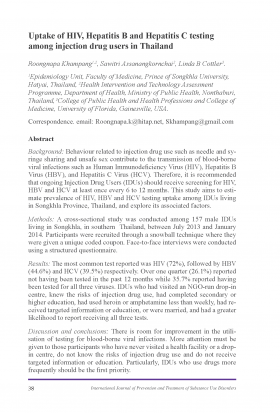This website uses cookies so that we can provide you with the best user experience possible. Cookie information is stored in your browser and performs functions such as recognising you when you return to our website and helping our team to understand which sections of the website you find most interesting and useful.
Uptake of HIV, Hepatitis B and Hepatitis C testing among injection drug users in Thailand (2015)

รายละเอียดเพิ่มเติม
Roongnapa Khampang1,2, Sawitri Assanangkornchai2, Linda B Cottler3.
1Epidemiology Unit, Faculty of Medicine, Prince of Songkhla University,
Hatyai, Thailand, 2Health Intervention and Technology Assessment
Programme, Department of Health, Ministry of Public Health, Nonthaburi,
Thailand, 3College of Public Health and Health Professions and College of
Medicine, University of Florida, Gainesville, USA.
Correspondence. email: [email protected], [email protected]
Abstract
Background: Behaviour related to injection drug use such as needle and syringe sharing and unsafe sex contribute to the transmission of blood-borne viral infections such as Human Immunodeficiency Virus (HIV), Hepatitis B Virus (HBV), and Hepatitis C Virus (HCV). Therefore, it is recommended that ongoing Injection Drug Users (IDUs) should receive screening for HIV, HBV and HCV at least once every 6 to 12 months. This study aims to estimate prevalence of HIV, HBV and HCV testing uptake among IDUs living in Songkhla Province, Thailand, and explore its associated factors.
Methods: A cross-sectional study was conducted among 157 male IDUs living in Songkhla, in southern Thailand, between July 2013 and January 2014. Participants were recruited through a snowball technique where they were given a unique coded coupon. Face-to-face interviews were conducted using a structured questionnaire.
Results: The most common test reported was HIV (72%), followed by HBV (44.6%) and HCV (39.5%) respectively. Over one quarter (26.1%) reported not having been tested in the past 12 months while 35.7% reported having been tested for all three viruses. IDUs who had visited an NGO-run drop-in centre, knew the risks of injection drug use, had completed secondary or higher education, had used heroin or amphetamine less than weekly, had received targeted information or education, or were married, and had a greater likelihood to report receiving all three tests.
Discussion and conclusions: There is room for improvement in the utilisation of testing for blood-borne viral infections. More attention must be given to those participants who have never visited a health facility or a dropin centre, do not know the risks of injection drug use and do not receive targeted information or education. Particularly, IDUs who use drugs more frequently should be the first priority.




